The Best Water Filter Pitchers, According to Sanitation Experts

Our editors independently select the products we recommend. We may earn a commission on items bought through our links.
Water filter pitchers are an unlikely, but effective, exemplification of the division of household labor. Rather than the clean drinking water they dispense, the crux of most discourse surrounding their existence has to do with who filled them (or didn’t fill them) last.
Today's Top Deals
They are a topic of petty tension for good reason: drinking water straight from the tap is a nostalgic proposition at best. According to a U.S. Geological Survey published in July of 2023, up to 45 percent of tap water samples gathered throughout the U.S. contained contaminants like per- and polyfluoroalkyl substances also known as “forever chemicals.”
In most cases, plumbers and water treatment experts recommend filters that attach to the faucet or under the sink and filter through reserve osmosis. “Reverse osmosis systems filter out dissolved ions and suspended particles in the water, including beneficial minerals,” explained Kyle Postmus, Senior Manager, the Global Water Division at the National Sanitation Foundation. Although these systems typically include a remineralization cartridge to compensate for that, the filtering process is still fallible after a $700-plus project. In other words, they work a little too well.
Enter water filter pitchers: a simple and affordable solution for anyone who wants cleaner drinking water without installing a permanent kitchen fixture. SPY asked a team of plumbers and water treatment experts what shoppers need to know about water filter pitchers, the best methods for filtering water at home, and which products across a variety of price points are worthwhile.
What the Experts Say
The German brand Brita has been the brand to beat in water filter pitchers since the 90s, accounting for up to 70 percent of the market with their affordable, easy-to-find vessels. An eco-friendly push from Brita and other companies looking to reduce the number of single-use plastic bottles made Brita a household name and brought the global water filter jug market to an estimated $1,072.47 million in 2022, with a projected compound annual growth rate of 10.9 percent.
When shopping for a filter that’ll remove water contaminants, and won’t experience bacteria buildup with proper care, look for a certification from the National Sanitation Foundation (NSF), among others. “Whether the device is made of plastic, stainless steel, or anything else, certification requires an evaluation of all materials that come into contact with drinking water and testing,” Postmus said.
The way basic filter pitchers work is by sending water through a mesh screen, followed by a layer of carbon particles that absorb mercury and copper. It’s worth noting, however, that a standard Brita filter does not remove lead, many pitcher filters on the market are pretty bad at removing fluoride. When prices range from $30 to a few hundred dollars, and flashy self-cleaning and infusing features, it’s hard for a casual water drinker to be certain that they’re not pouring money down the drain.
An installed water treatment system is the best way to ensure certain contaminants are consistently and adequately being filtered out, but if one needs something simple, it’s best to invest in a filter that removes lead, according to Andrew Miles, a plumber with over 30 years of experience.
“Don’t just shop on price if you want the purest water possible,” Miles, the founder of the consumer education platform H2O Insider, told SPY. Here are the filters Miles and Geambasu recommend for getting the job done.
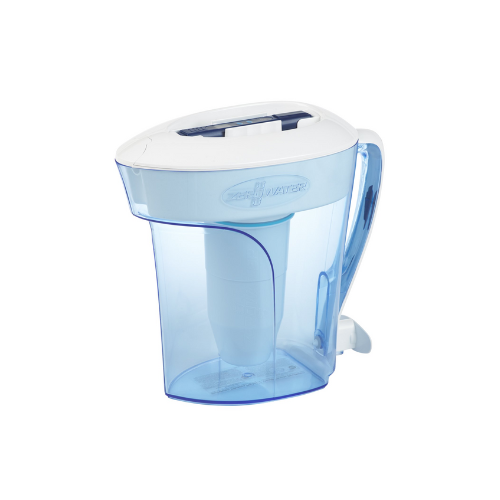
BEST OVERALL
ZeroWater Filter Pitcher
Buy Now On Amazon
The Environmental Working Group (EWG) ranks ZeroWater among its best filter pitchers for removing PFAs. The pitcher has been subjected to extensive testing based on NSF standards and EPA-approved methods and it’s certified by the International Association of Plumbing & Mechanical Officials (IAPMO) as well.
“I’ve found that this removed more dissolved solids and contaminants in my testing,” Miles, who personally uses it in his three-person household, said.
While standard filter pitchers typically go through two stages of filtration, ZeroWater filters go through five stages of filtration to remove heavy metals, chlorine, other foreign ions, and any remaining total undissolved solids (TDS). The more complex filtration gives it a slower flow rate, but that is a good thing, Miles stressed. “The longer the water takes to filter through the pitcher’s filter, the more contaminants it will generally remove.”
It’s best to refill the ZeroWater filter pitcher after each use, and the filters have to be replaced more frequently than other products (about once a month). Likewise, the unique pitcher design does not have a compartment in the lid that most Brita-like pitchers have, and ZeroWater pitcher users have to take off the top to refill the pitcher. But Miles prefers this, as it minimizes dripping and spills.
“That is the only way to fill a pitcher, really,” he contended. “But it comes down to preference. I’ve used many different ones and the most important part for me is the filtering capability of the pitcher.”
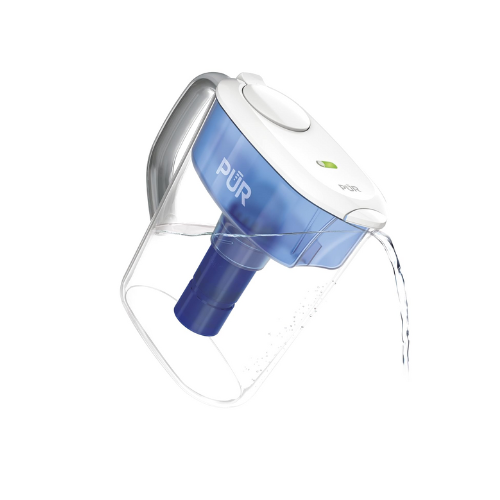
BEST BASIC PITCHER
PUR PLUS Filter Pitcher
Buy Now On Amazon
The PUR PLUS water filter pitcher is tested and certified by the NSF and Water Quality Administration (WQA). It has a faster flow rate than the ZeroWater pitcher but less filtration as a trade-off. The PUR brand has better filtration than a Brita filter but the pitcher design isn’t as sturdy and it’s easier to spill. It’s a matter of priorities, preferences, and willingness to wipe up a little clean water.
Miles cautioned against the standard PUR pitchers, which are slightly less expensive than this one, as they don’t remove heavy metals like lead as effectively. He suggests the 11-cup PUR PLUS pitcher for anyone with tolerable tap water. “This is a solid option if you are looking to filter a broad range of contaminants, and is typically good for households where their tap water isn’t that bad to begin with,” he advised. As the only dishwasher-safe option, PUR pitchers are the most convenient to clean. And there is no sense in filtering water in a dirty pitcher.
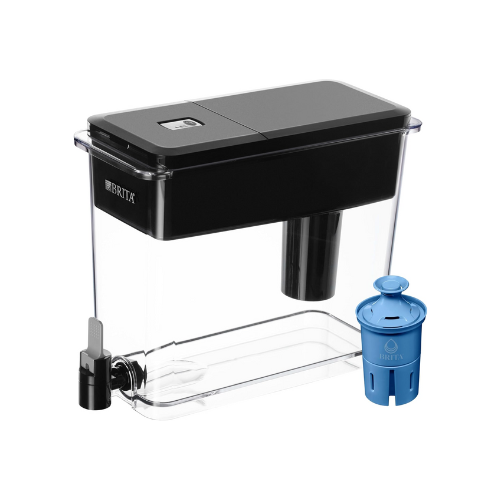
BEST LARGE CAPACITY
Brita UltraMax Dispenser With Elite Filter
Buy Now On Amazon
Larger countertop dispensers are a cost-effective alternative to pitchers for large families, offices, or anyone who drinks a ton of water, but not all jugs are created equal. A Brita UltraMax with a standard filter is the cheapest large option out there that’ll filter most of the worrisome contaminants. The jug itself has a user-friendly design as well as an efficient flow rate.
Geambasu suggests spending a little more on the Elite filter which can be added to this large jug for a slower flow rate but better filtration. “The Elite filter will remove more lead in your water while doing a better job filtering out things such as chlorine cadmium, mercury, and other contaminants.”
Certified by the (WQA and the IAPMO, Miles agreed the Elite Brita filter “will get you decent drinking water” and is the best option on the market at this capacity.
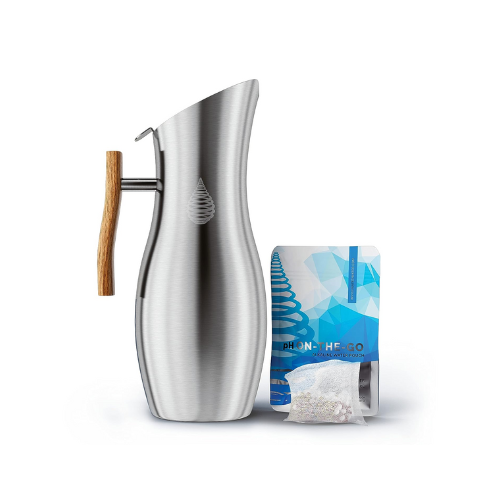
PLASTIC-FREE
Invigorated Water Stainless Steel Vitality Filter Pitcher
Buy Now On Amazon
For pitchers that have become popular partially because people want to reduce their use of plastic, it’s surprisingly difficult to find any non-plastic pitcher options on the market. However, the company Invigorated Water offers an alternative, alkaline “Vitality” pitcher in a sleek, steel vessel with a stylish wooden handle.
The difference between alkaline filters and other filters on the market is that drinkers have the option of increasing the pH of their water while filtering it. Alkaline water is thought to have health benefits such as neutralizing acid in blood, but this is still a subject of debate among scientists.
“Offering both filtration and alkalization is quite impressive,” Miles acknowledged. But without publicly-available testing, it’s a lot of money to spend on a pitcher that, despite high ratings for its ease of use and sleep design, only allegedly removes fluoride and lead.
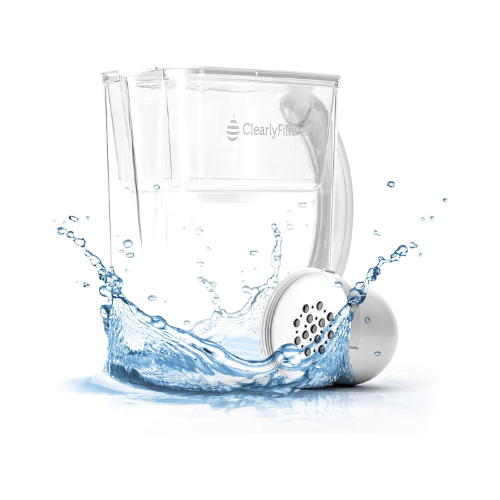
BEST SPLURGE
Clearly Filtered Pitcher
Buy Now On Amazon
WQA-certified and tested according to NSF standards, the Clearly Filtered pitcher is the most extravagant pitcher our experts recommended with a price tag of around $110. This is a lot of money for a pitcher who earns customer complaints for taking an excruciatingly long time to filter and refill. It might not be the best choice for someone with a limited budget and patience, but it’ll get you the cleanest water possible with a handheld solution.
For hydration buffs looking to improve the purity and taste of what’s on tap, this brand is known for “exceptional filtration capabilities of chlorine, fluoride, and heavy metals while retaining beneficial minerals,” Miles said, while producing “noticeably purer and fresher tasting water.”
The pitcher is a splurge, about four times the price of a Brita. But the filter longevity helps to offset this, lasting up to four months or approximately 100 gallons of water. “It is more cost-effective and environmentally friendly compared to many other filter pitchers that require more frequent replacements,” said Miles.
Frequently Asked Questions About Water Filter Pitchers
Is It Safe To Drink Tap Water?
Generally, yes, as the presence of PFAS doesn’t make water unsafe necessarily. However, many people do not want to play those odds, so they install reverse osmosis systems under the sink, or filters on their faucets for the maximum amount of water filtration available. Everyone else who wants to cut down on their plastic waste while staying hydrated usually opts for a water pitcher designed to filter out contaminants, including fluoride and lead.
Do Britas Really Work?
For brand loyalists, Brita water filters are certainly better than nothing, but their Elite filter is best. The same thing goes for other mid-range models like the PUR PLUS filters. When in doubt, always spring for the better filter, even if it feels like a marketing ploy. (It’s not.)
Do I Really Have To Change The Filter?
In short, yes. In a study often cited by Brita skeptics, researchers found that improper filter maintenance resulted in 10,000 times the amount of bacteria colonies found in straight tap water. Since most people are trying to make clean water rather than kombucha, that is not ideal.
It is worth noting that this study was conducted in 1996 when the Brita was a relatively new luxury and consumer education was lower than today. The design of the Brita and its counterparts has improved over the years, and now even the basic models are equipped with filter change indicators. So if someone wants to drink a cold cup of bacteria, that is on them.
Is New York City’s Water Really That Good?
Although NYC’s water quality is better than a lot of American cities, it is not without contaminants. The EWG identified 18 contaminants, 10 of which exceeded the organization’s guidelines, but still compliance within federal drinking water standards. In other words, New York City’s water is good, but probably not good enough to be the secret ingredient in NYC bagels.
Keep it Simple!
High-tech features like “smart pitchers” or a “self-cleaning” mode is less crucial than the quality of the filtration itself, Miles said. “These features could be considered overrated due to concerns about the actual efficacy of self-cleaning mechanisms, the amount of actual manual maintenance, plus the higher costs,” Miles said. Filters that promise to add minerals back into water are less necessary and contribute to a higher price point. In the end, removing heavy metals like lead, forever chemicals, and other contaminants, and making water taste good enough to drink the recommended 9 to 13 cups a day, is what matters most.
When to Call a Plumber
Water filter pitchers can do a lot to improve anyone’s tap water, but they don’t work miracles. If water continues to look discolored or taste off after trying a tested filter, there could be an underlying plumbing issue. Though there are home water testing kits and it can be fun to play chemistry, Miles would call in a professional (if he wasn’t already one of them).
More Top Deals from SPY
Best of SPY
